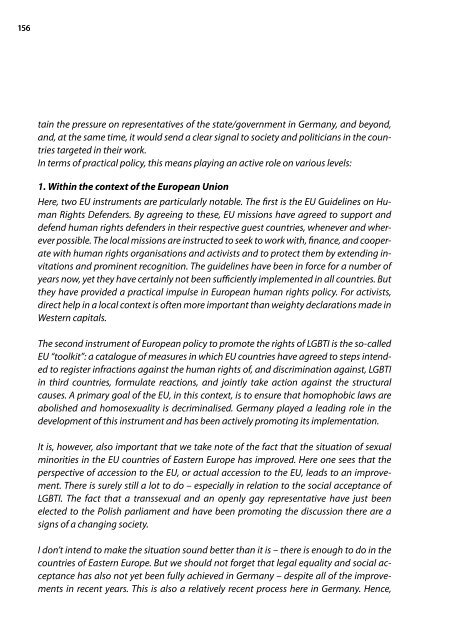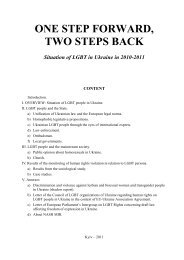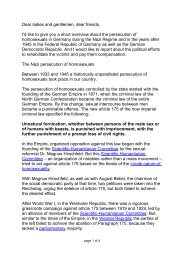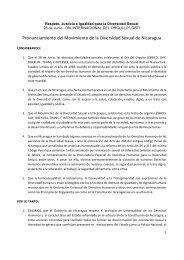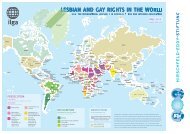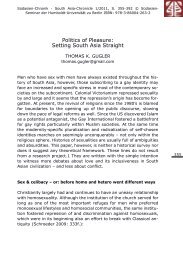Vom Verbot zur Gleichberechtigung - Hirschfeld-Eddy-Stiftung
Vom Verbot zur Gleichberechtigung - Hirschfeld-Eddy-Stiftung
Vom Verbot zur Gleichberechtigung - Hirschfeld-Eddy-Stiftung
Sie wollen auch ein ePaper? Erhöhen Sie die Reichweite Ihrer Titel.
YUMPU macht aus Druck-PDFs automatisch weboptimierte ePaper, die Google liebt.
156<br />
tain the pressure on representatives of the state/government in Germany, and beyond,<br />
and, at the same time, it would send a clear signal to society and politicians in the countries<br />
targeted in their work.<br />
In terms of practical policy, this means playing an active role on various levels:<br />
1. Within the context of the European Union<br />
Here, two EU instruments are particularly notable. The first is the EU Guidelines on Human<br />
Rights Defenders. By agreeing to these, EU missions have agreed to support and<br />
defend human rights defenders in their respective guest countries, whenever and wherever<br />
possible. The local missions are instructed to seek to work with, finance, and cooperate<br />
with human rights organisations and activists and to protect them by extending invitations<br />
and prominent recognition. The guidelines have been in force for a number of<br />
years now, yet they have certainly not been sufficiently implemented in all countries. But<br />
they have provided a practical impulse in European human rights policy. For activists,<br />
direct help in a local context is often more important than weighty declarations made in<br />
Western capitals.<br />
The second instrument of European policy to promote the rights of LGBTI is the so-called<br />
EU “toolkit”: a catalogue of measures in which EU countries have agreed to steps intended<br />
to register infractions against the human rights of, and discrimination against, LGBTI<br />
in third countries, formulate reactions, and jointly take action against the structural<br />
causes. A primary goal of the EU, in this context, is to ensure that homophobic laws are<br />
abolished and homosexuality is decriminalised. Germany played a leading role in the<br />
development of this instrument and has been actively promoting its implementation.<br />
It is, however, also important that we take note of the fact that the situation of sexual<br />
minorities in the EU countries of Eastern Europe has improved. Here one sees that the<br />
perspective of accession to the EU, or actual accession to the EU, leads to an improvement.<br />
There is surely still a lot to do – especially in relation to the social acceptance of<br />
LGBTI. The fact that a transsexual and an openly gay representative have just been<br />
elected to the Polish parliament and have been promoting the discussion there are a<br />
signs of a changing society.<br />
I don’t intend to make the situation sound better than it is – there is enough to do in the<br />
countries of Eastern Europe. But we should not forget that legal equality and social acceptance<br />
has also not yet been fully achieved in Germany – despite all of the improvements<br />
in recent years. This is also a relatively recent process here in Germany. Hence,


